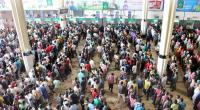 Bangladesh is pursuing humanitarian diplomacy for the well being of the vulnerable people, including Rohingyas, across the world.
Bangladesh is pursuing humanitarian diplomacy for the well being of the vulnerable people, including Rohingyas, across the world.
It has adopted a mixed strategy of humanitarian diplomacy combining bilateral and multilateral engagements.
“Bangladesh was born out of humanitarian crisis and we cannot be non-responsive to such crisis anywhere in the world,” Foreign Secretary M Shahidul Haque told Bangla Tribune.
Rohingya crisis has increased the capacity of the government to handle humanitarian diplomacy and Bangladesh now maneuvers, not only at the UN bodies, but also with global players bilaterally, he said.
Humanitarian diplomacy is such an action in which a country reacts to humanitarian calls. Some countries including the US and Scandinavian countries pursue such diplomacy.
Nine months ago Prime Minister Sheikh Hasina made a humanitarian call to resolve the Rohingya crisis, Foreign Secretary Haque said before adding that Bangladesh’s strategy now centres on the proposals she floated at the UN.
Since then, Bangladesh itself or through its allies are very active in the UN offices in New York and Geneva in pursuing humanitarian diplomacy.
A foreign ministry official, seeking anonymity, said conflicts across the world has increased to 11 in 2014 from 4 in 2007, which have left 65.5 million displaced.
“Humanitarian diplomacy is persuading decision makers to act at all times in the interest of vulnerable people and that’s why its concept is ambiguous, confusing and fluid,” he said.
Bangladesh opened the border for Rohingyas on a completely humanitarian ground, but there was a possibility it might have a negative impact on its national interest, he added.
“We are acting like a responsible and responsive nation and we believe that our humanitarian diplomacy will prevail at the end.”
 National
National
41190 hour(s) 0 minute(s) ago ;
Midnight 12:54 ; Sunday ; Jun 29, 2025
Dhaka pursuing humanitarian diplomacy
Send
Sheikh Shahariar Zaman
Published : 08:00, Jun 01, 2018 | Updated : 08:00, Jun 01, 2018
Published : 08:00, Jun 01, 2018 | Updated : 08:00, Jun 01, 2018
0 ...0 ...
/ssz/zmi/
Topics: Top Stories
- KOICA donates medical supplies to BSMMU
- 5 more flights to take back British nationals to London
- Covid19: Rajarbagh, Mohammadpur worst affected
- Momen joins UN solidarity song over COVID-19 combat
- Covid-19: OIC to hold special meeting
- WFP begins food distribution in Cox’s Bazar
- WFP begins food distribution in Cox’s Bazar
- 290 return home to Australia
- Third charter flight for US citizens to return home
- Dhaka proposes to postpone D8 Summit
Unauthorized use of news, image, information, etc published by Bangla Tribune is punishable by copyright law. Appropriate legal steps will be taken by the management against any person or body that infringes those laws.
Bangla Tribune is one of the most revered online newspapers in Bangladesh, due to its reputation of neutral coverage and incisive analysis.
F R Tower, 8/C Panthapath, Shukrabad, Dhaka-1207 | Phone: 58151324; 58151326, Fax: 58151329 | Mob: 01730794527, 01730794528


